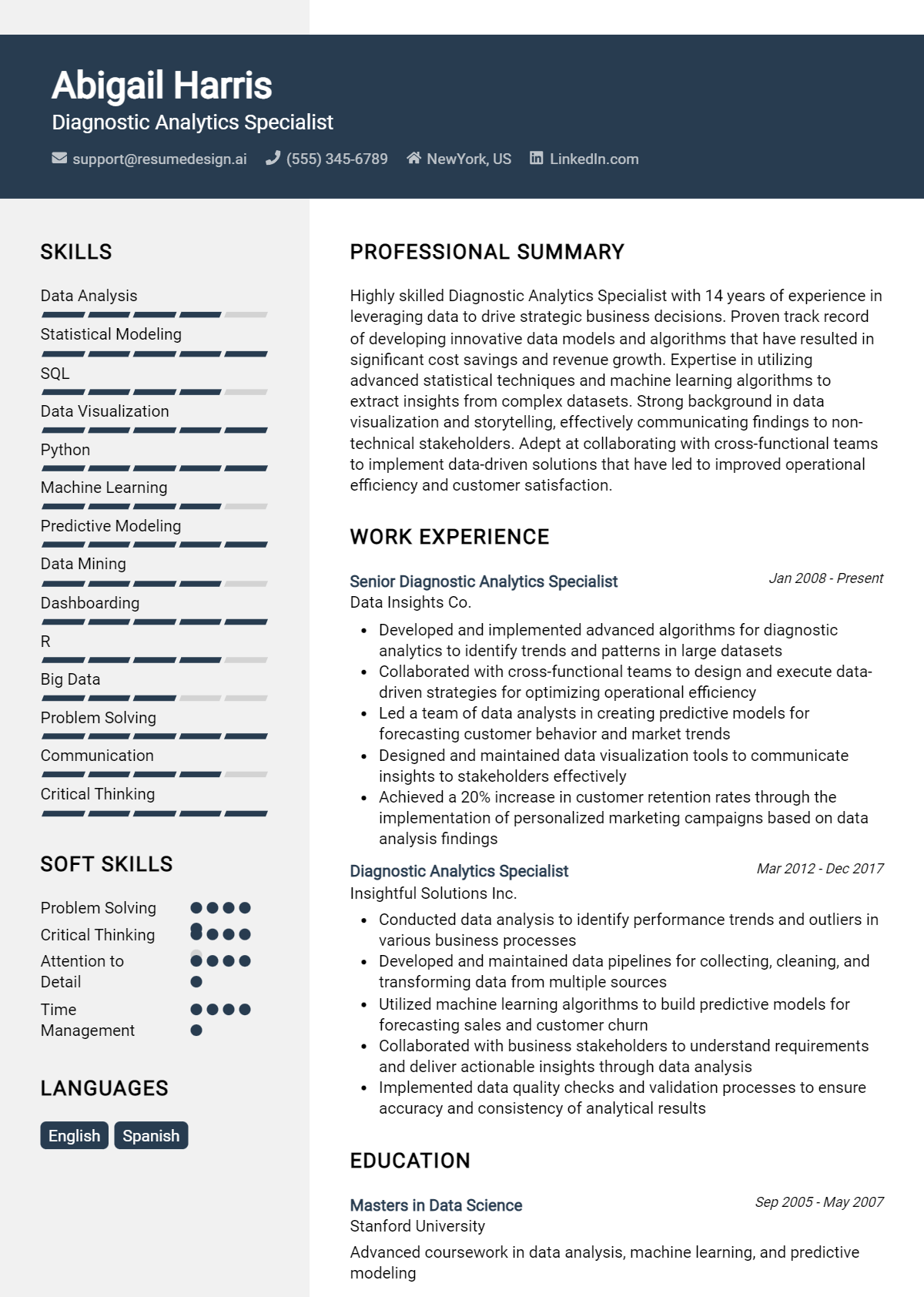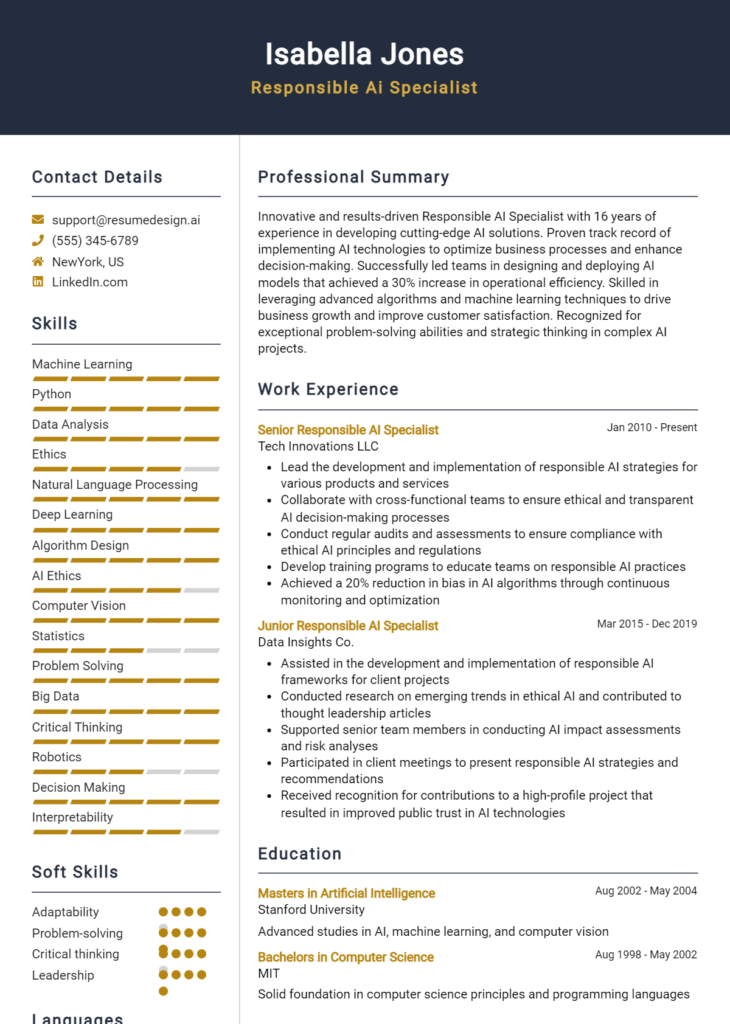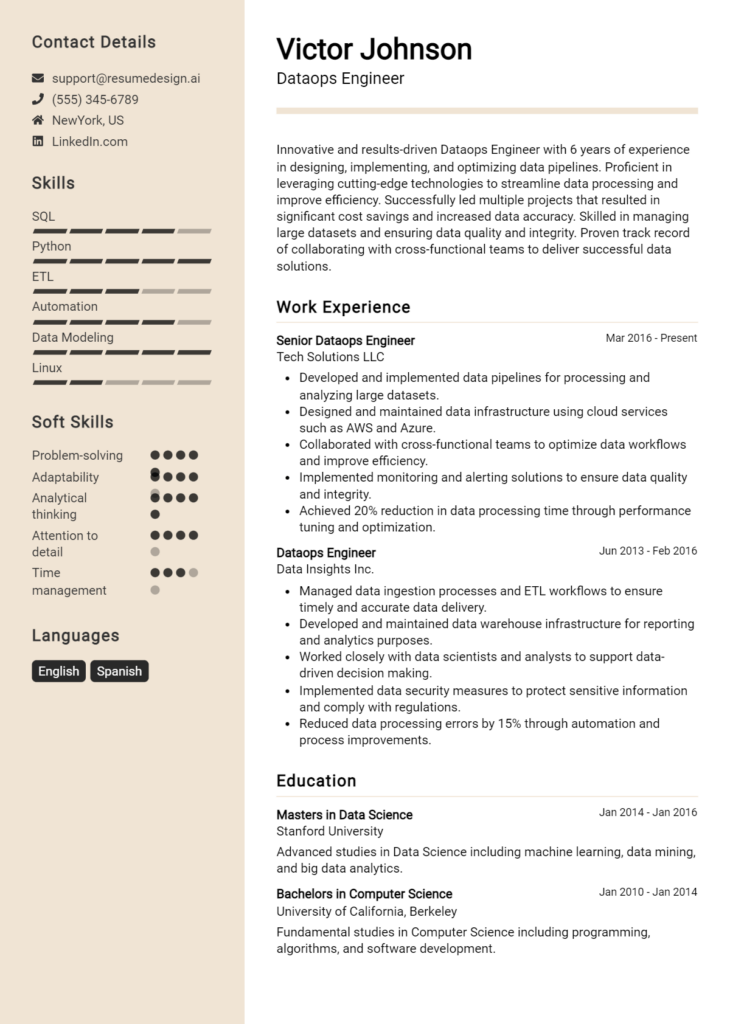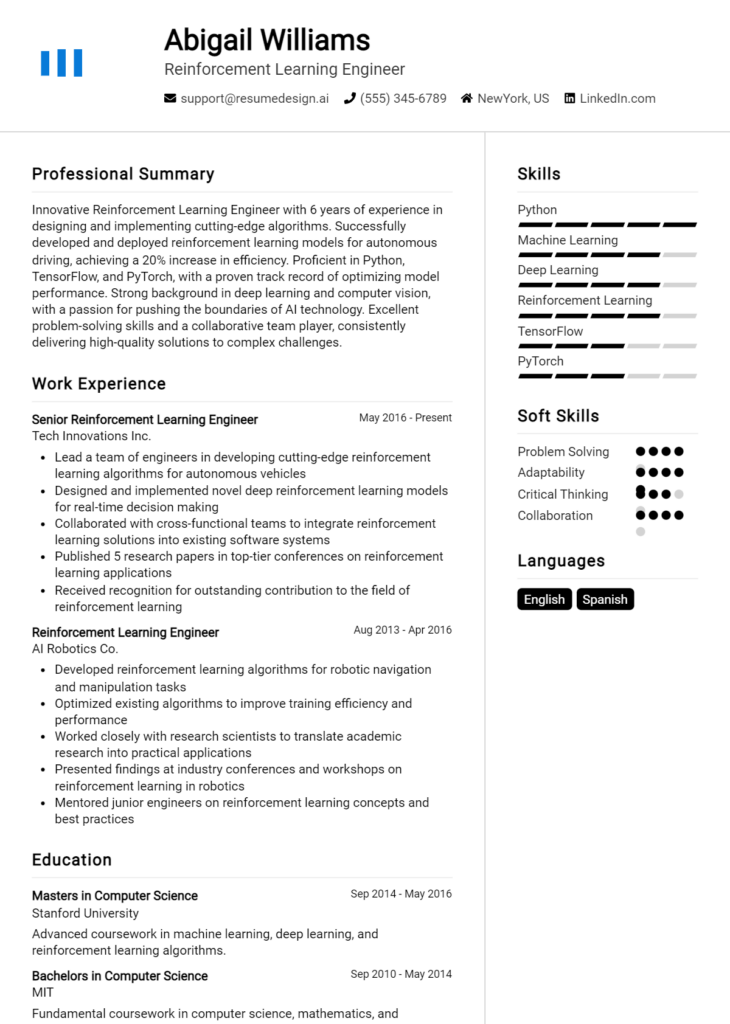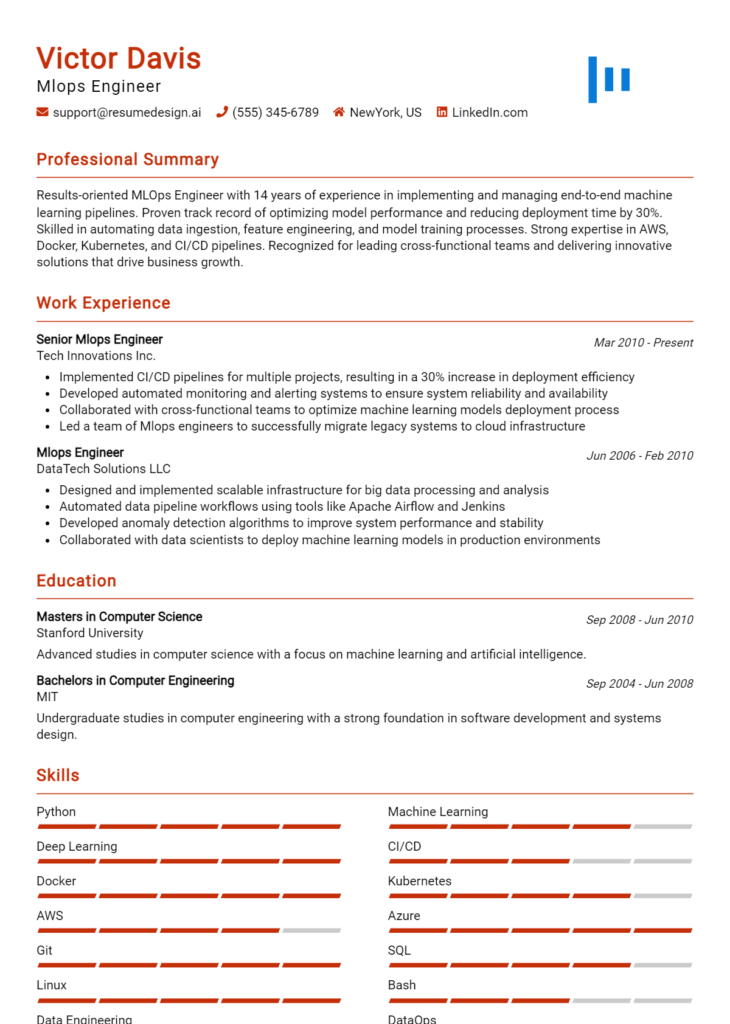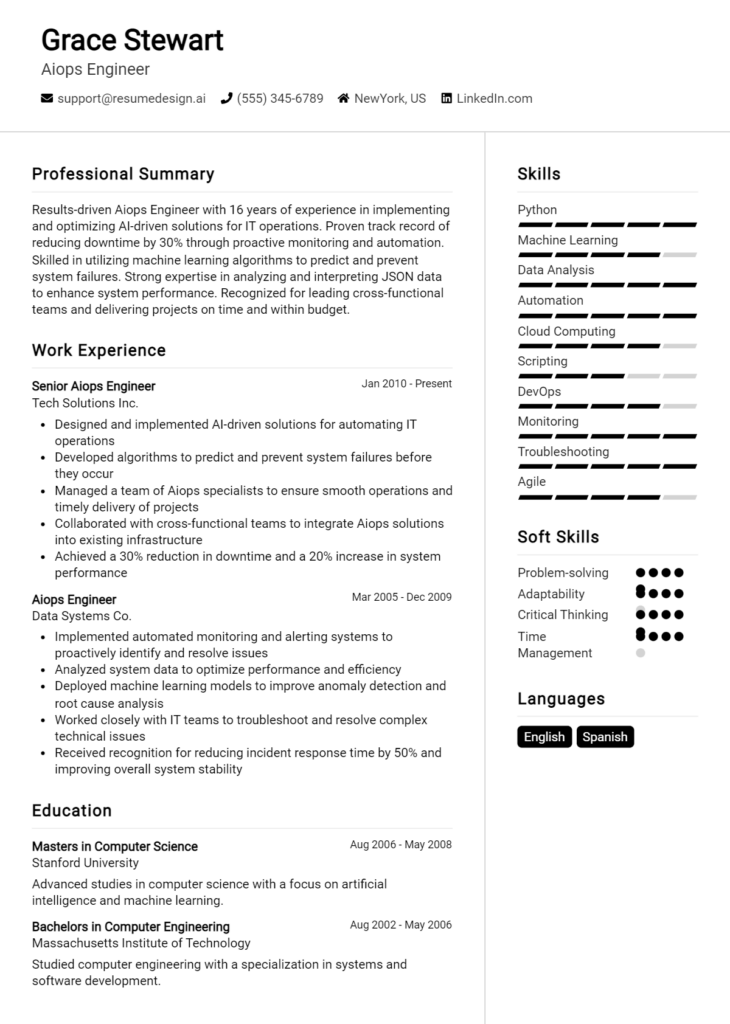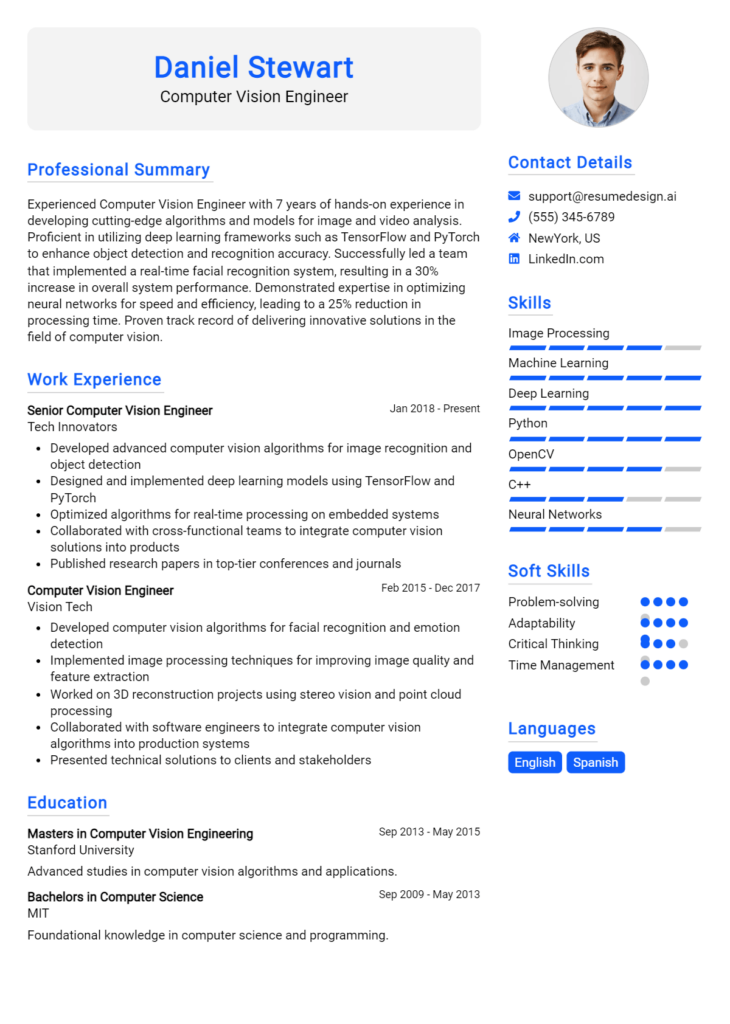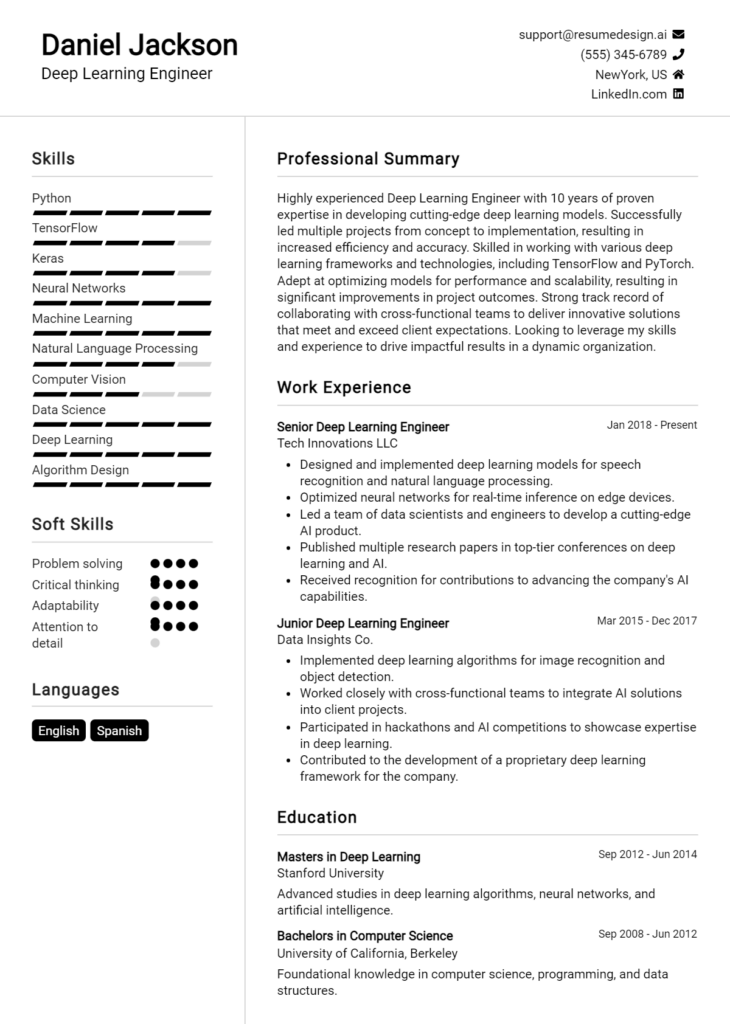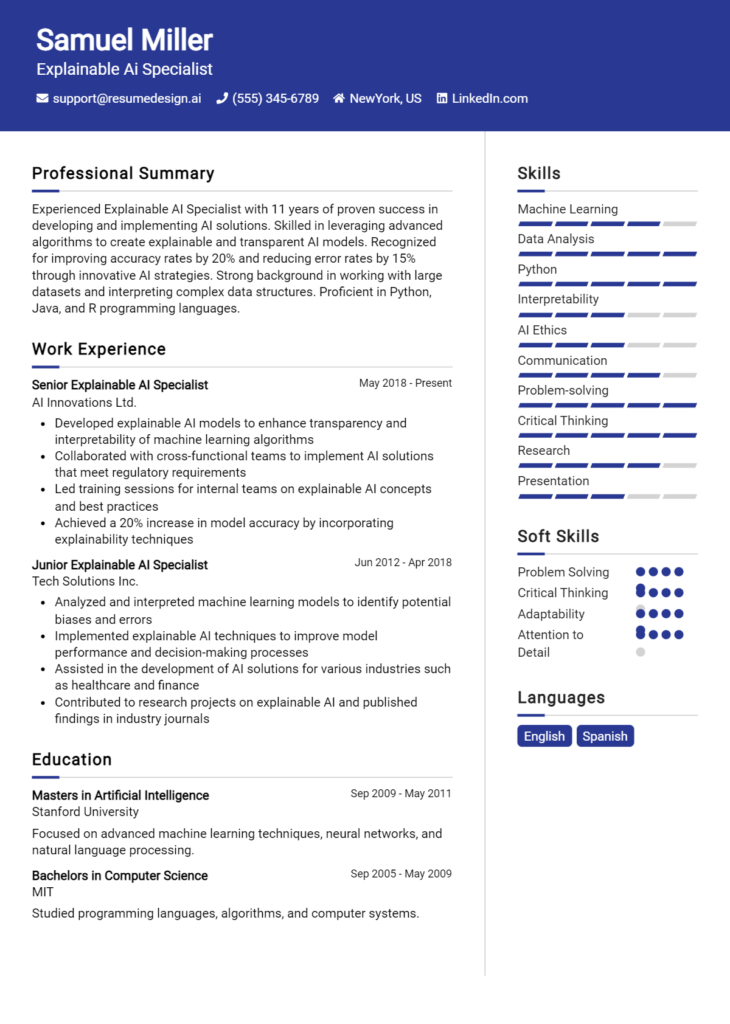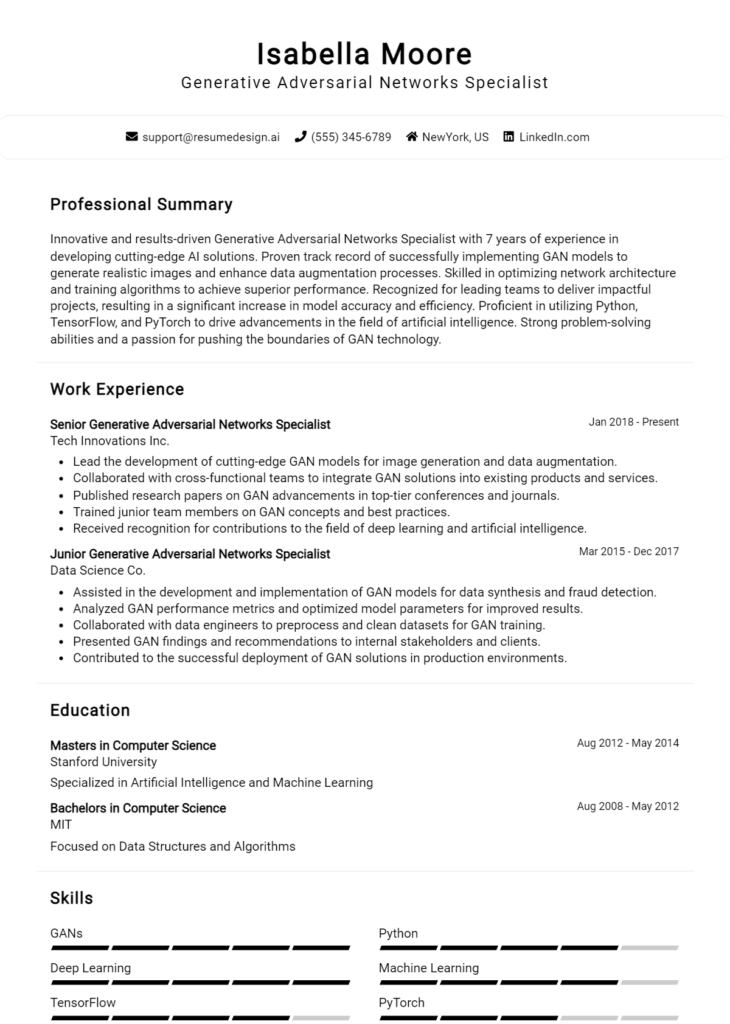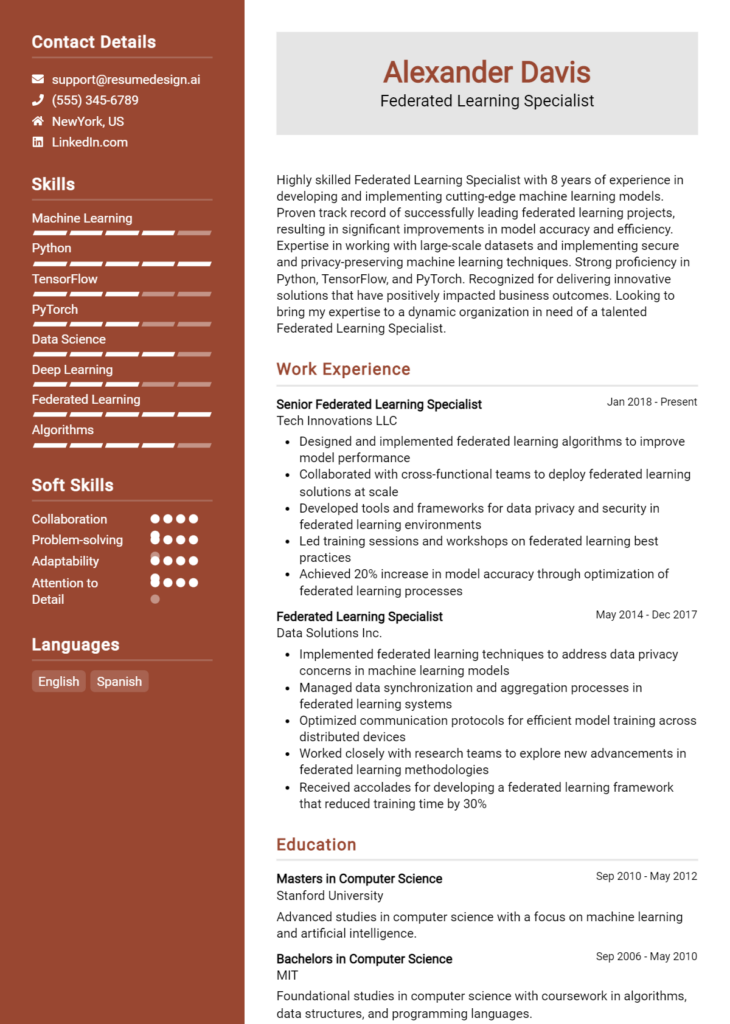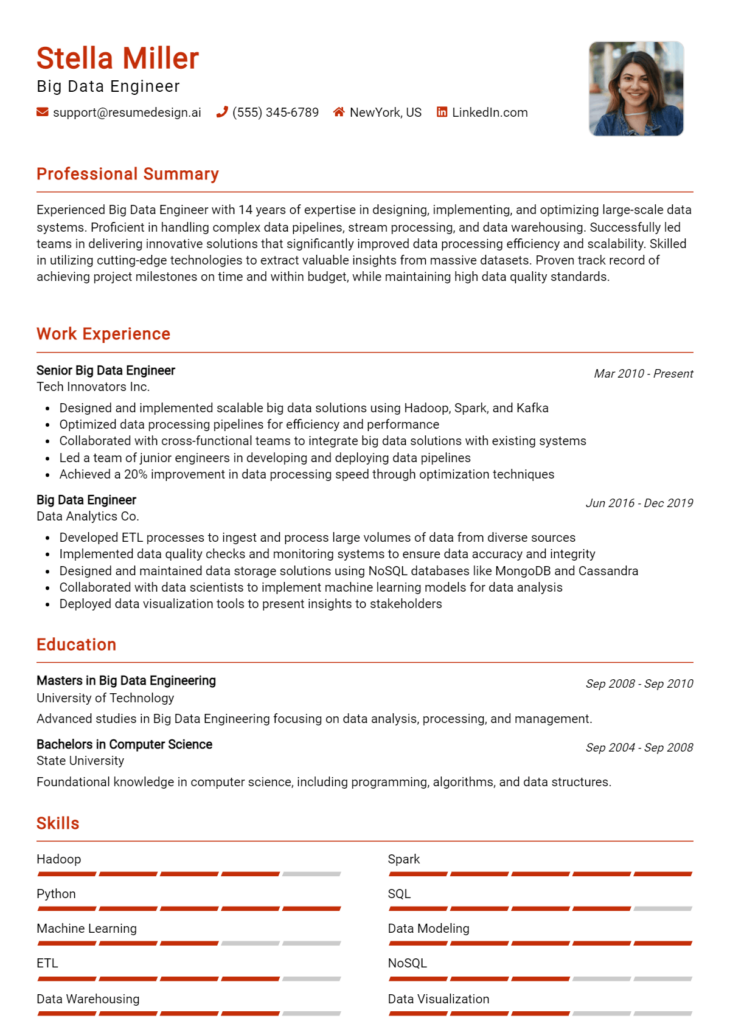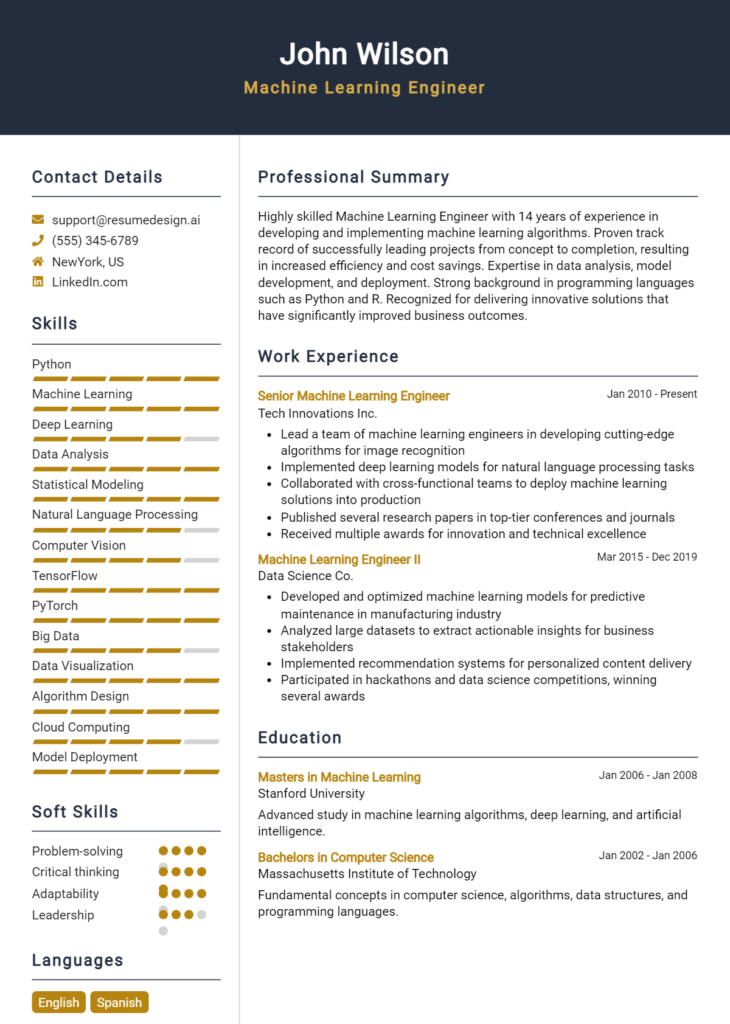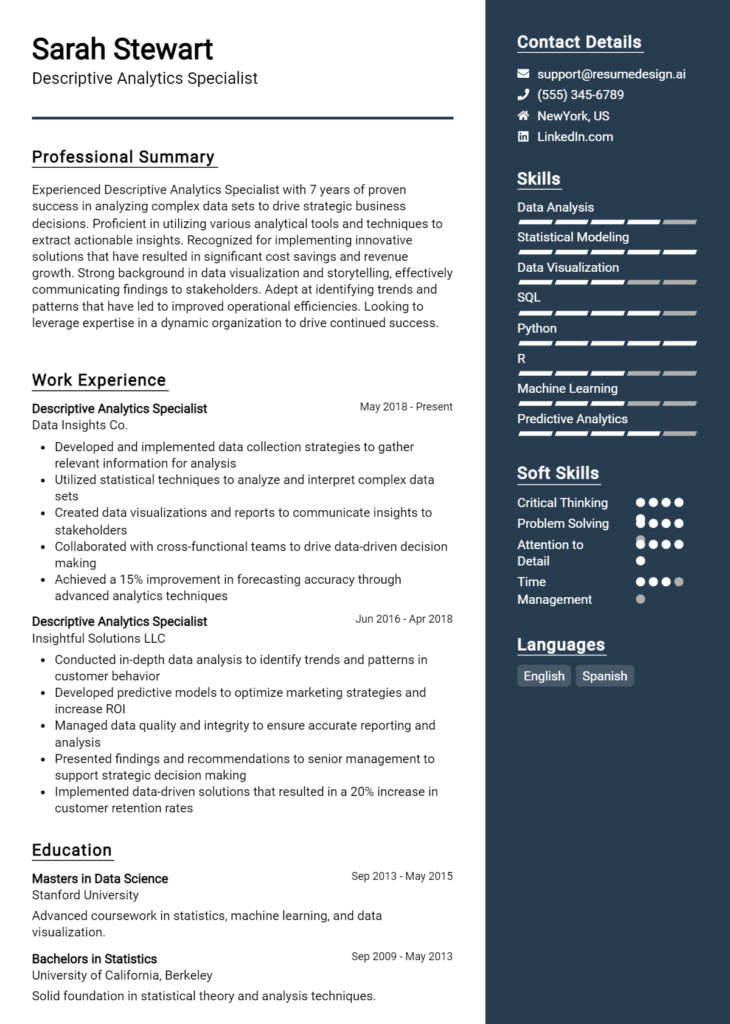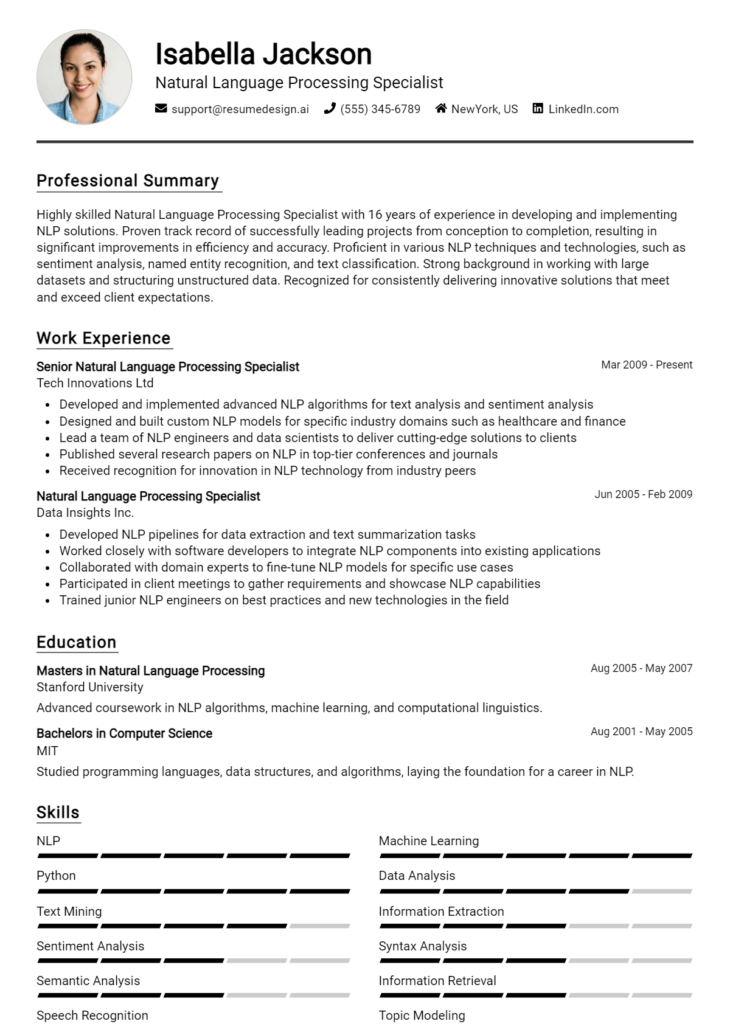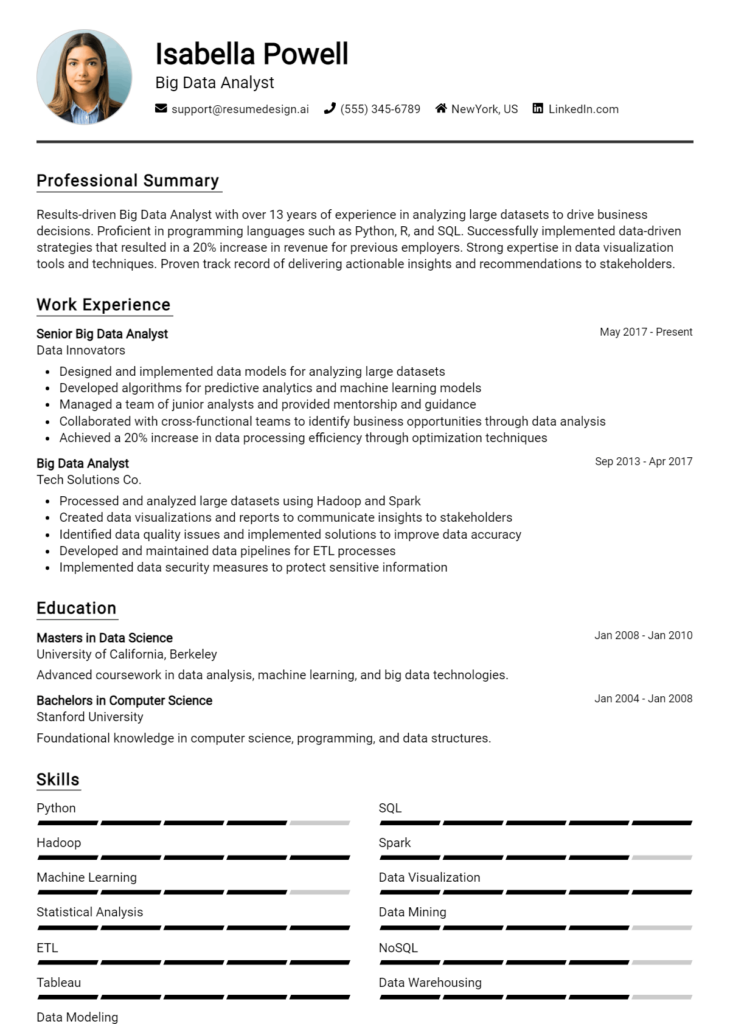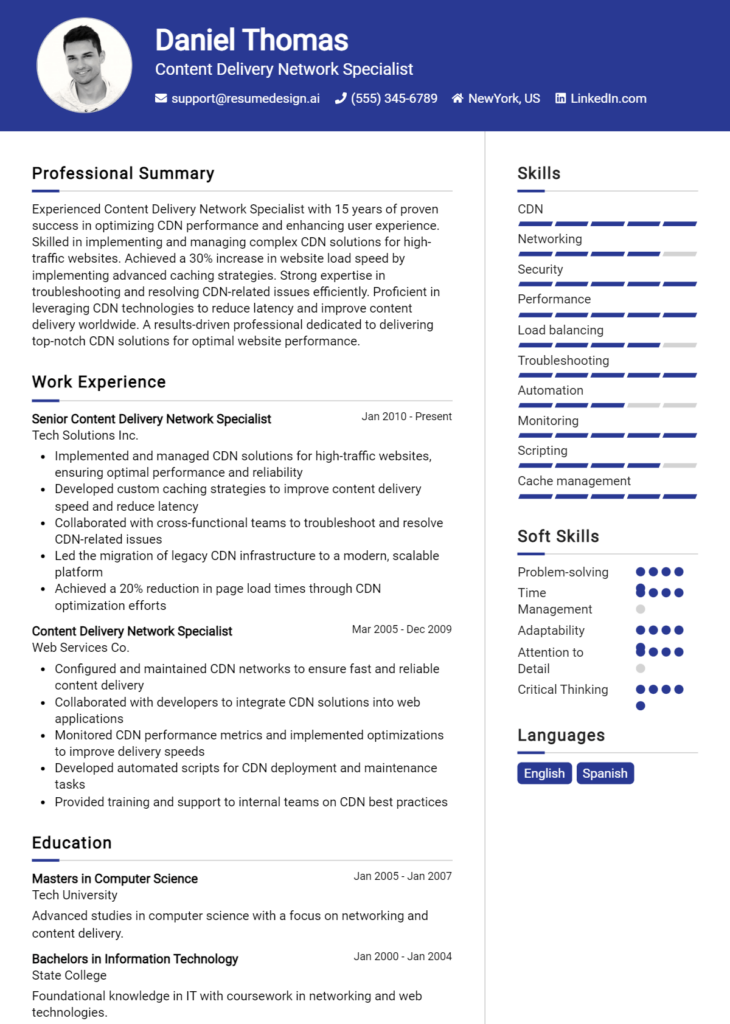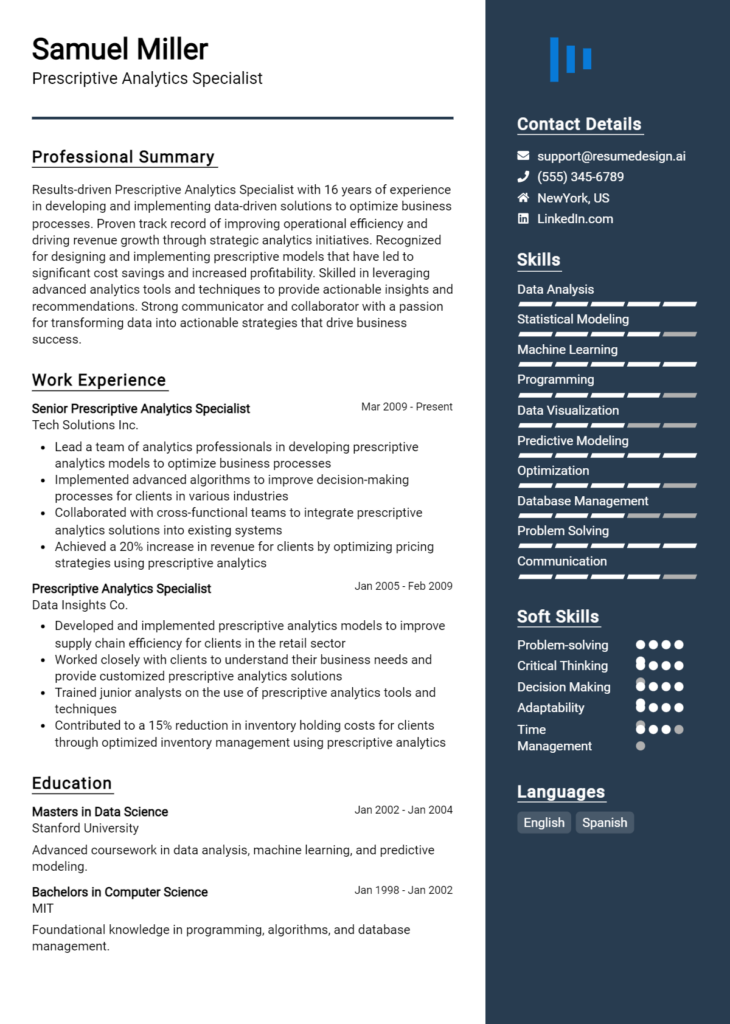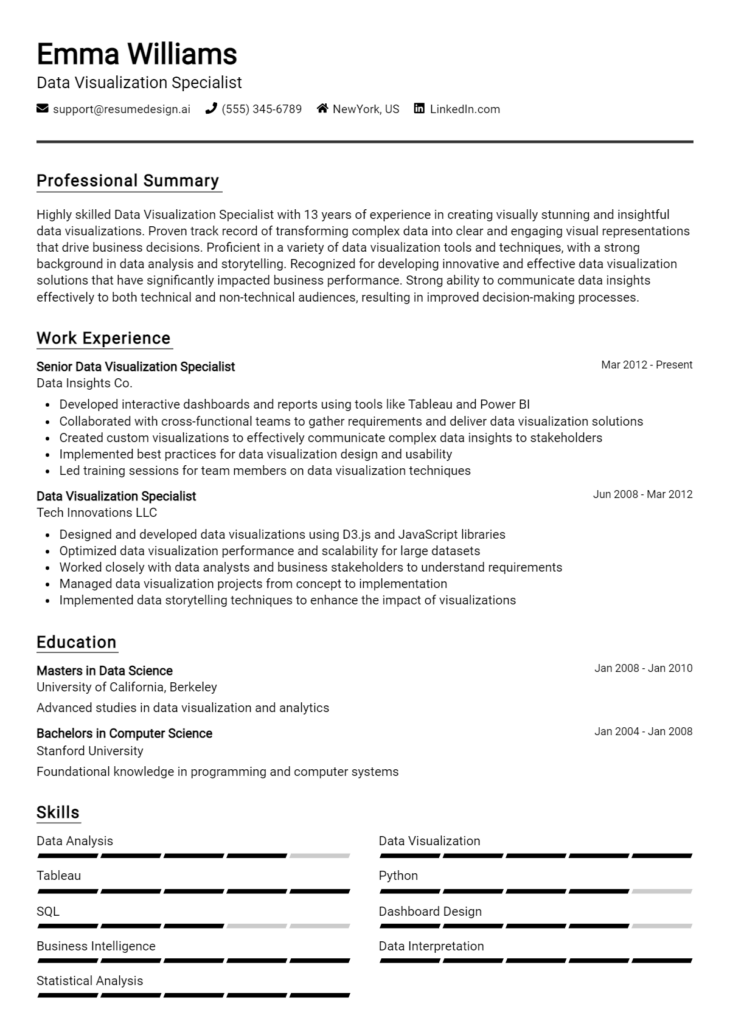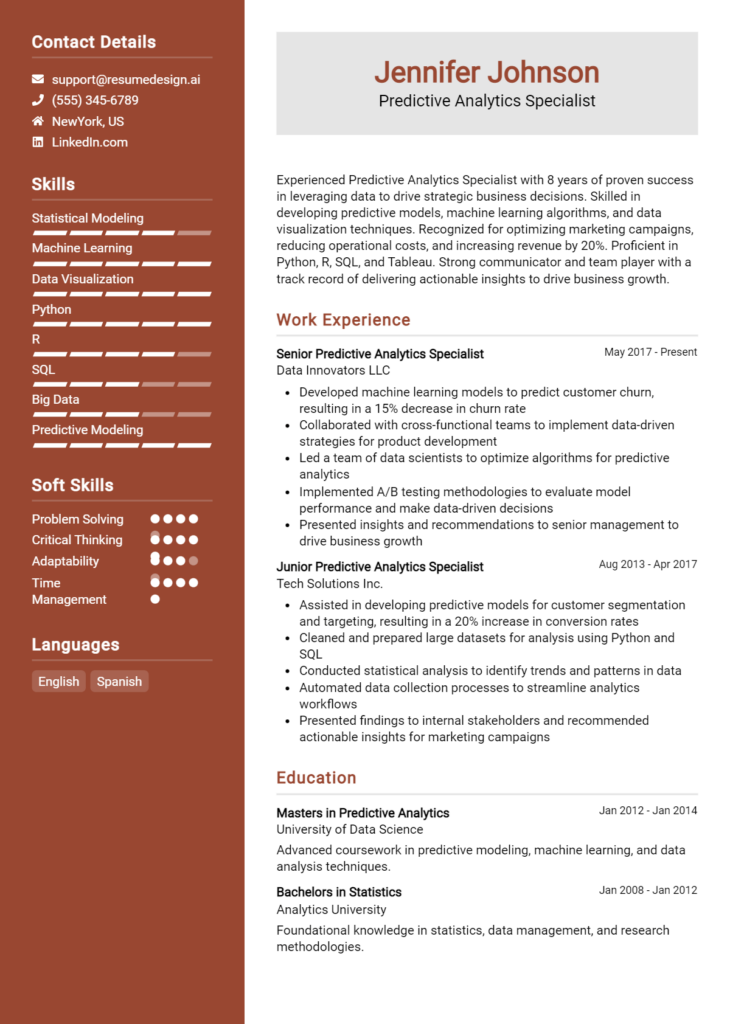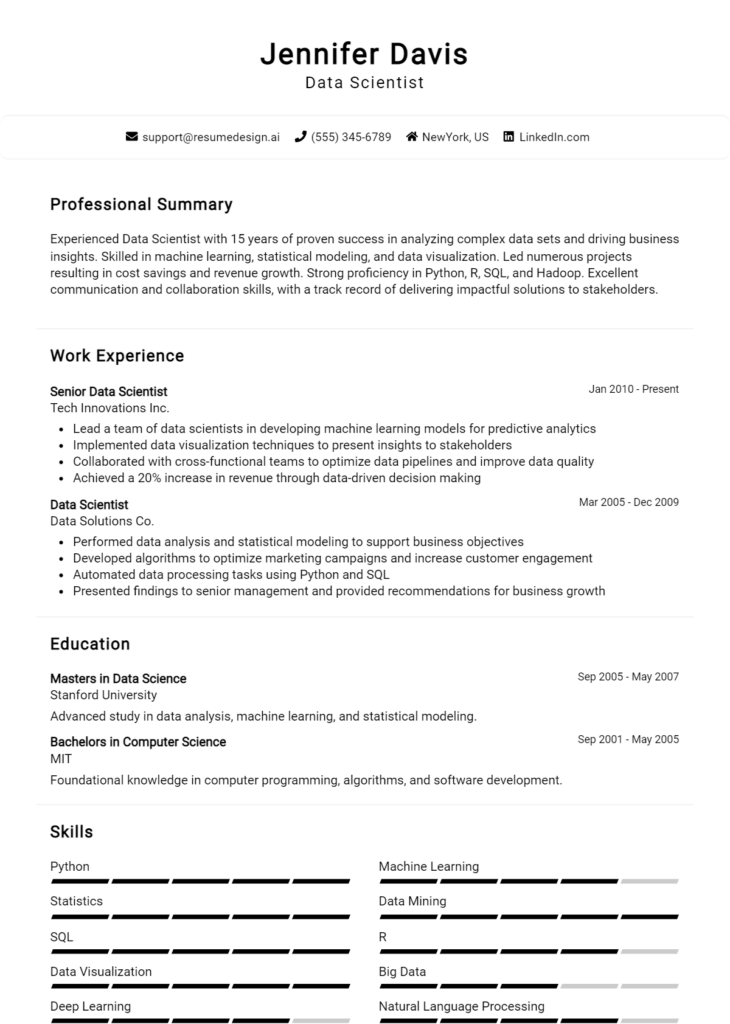Diagnostic Analytics Specialist Core Responsibilities
A Diagnostic Analytics Specialist plays a crucial role in bridging various departments by transforming data into actionable insights. Key responsibilities include analyzing complex data sets, identifying trends, and collaborating with cross-functional teams to address operational challenges. Essential skills encompass technical proficiency in analytics tools, strong problem-solving abilities, and a deep understanding of business processes. These competencies drive informed decision-making, contributing significantly to the organization's strategic goals. A well-structured resume can effectively highlight these qualifications, showcasing the candidate's value to potential employers.
Common Responsibilities Listed on Diagnostic Analytics Specialist Resume
- Analyze large data sets to identify trends and patterns.
- Collaborate with cross-functional teams to define analytical requirements.
- Develop and implement diagnostic models to improve operational efficiency.
- Present findings and recommendations to stakeholders.
- Utilize advanced analytics tools and software for data analysis.
- Monitor and evaluate the effectiveness of implemented solutions.
- Provide training and support to team members on analytics tools.
- Conduct root cause analysis to address operational issues.
- Prepare comprehensive reports summarizing analytical insights.
- Stay updated with industry trends and best practices in analytics.
- Support data governance and quality assurance initiatives.
High-Level Resume Tips for Diagnostic Analytics Specialist Professionals
In today's competitive job market, a well-crafted resume is essential for Diagnostic Analytics Specialists looking to make a strong first impression on potential employers. Your resume serves as the initial point of contact, showcasing not just your skills and experience but also your unique achievements in the field. A thoughtfully designed resume can set you apart from other candidates, demonstrating your expertise in diagnostic analytics and your ability to contribute to an organization’s success. This guide aims to provide practical and actionable resume tips specifically tailored for Diagnostic Analytics Specialist professionals, ensuring your application stands out and catches the eye of hiring managers.
Top Resume Tips for Diagnostic Analytics Specialist Professionals
- Tailor your resume to match the specific job description, using keywords and phrases from the posting.
- Highlight relevant experience in diagnostic analytics, including projects, tools used, and methodologies applied.
- Quantify your achievements with metrics, such as improved accuracy rates or cost savings, to demonstrate your impact.
- Showcase industry-specific skills, such as data visualization, statistical analysis, and machine learning techniques.
- Include certifications and training relevant to diagnostic analytics, such as Six Sigma or advanced analytics courses.
- Use a clean and professional format, ensuring readability and easy navigation for hiring managers.
- Incorporate a summary or objective statement that clearly outlines your career goals and what you bring to the role.
- Highlight collaborative projects that demonstrate your ability to work within cross-functional teams.
- Utilize action verbs to convey your responsibilities and accomplishments effectively.
By implementing these tailored resume tips, you can significantly increase your chances of landing a job in the Diagnostic Analytics Specialist field. A focused and well-presented resume not only highlights your relevant skills and achievements but also positions you as a valuable candidate ready to tackle the challenges within the industry. Stand out in a crowded job market by presenting your qualifications in a compelling and professional manner.
Why Resume Headlines & Titles are Important for Diagnostic Analytics Specialist
In the competitive field of diagnostic analytics, a well-crafted resume headline or title serves as a critical first impression for candidates applying for the role of Diagnostic Analytics Specialist. A strong headline effectively captures the attention of hiring managers by succinctly summarizing a candidate's key qualifications in a single impactful phrase. This brief yet powerful statement should reflect the applicant's expertise, making it immediately clear how they align with the job requirements. By being concise and relevant, the headline sets the tone for the rest of the resume and entices hiring managers to delve deeper into the candidate's qualifications.
Best Practices for Crafting Resume Headlines for Diagnostic Analytics Specialist
- Keep it concise: Aim for a headline that is no more than 10 words.
- Be specific: Use industry-related keywords that match the job description.
- Highlight key skills: Focus on a couple of your strongest relevant skills.
- Showcase your achievements: Include measurable results if possible.
- Use action-oriented language: Start with strong verbs that convey your impact.
- Tailor for each application: Customize your headline for the specific job role.
- Maintain professionalism: Avoid slang or overly casual language.
- Consider your audience: Use terms that resonate with hiring managers in the field.
Example Resume Headlines for Diagnostic Analytics Specialist
Strong Resume Headlines
"Data-Driven Diagnostic Analytics Expert with 5+ Years Experience"
“Proven Track Record in Leveraging Predictive Analytics for Healthcare Solutions”
“Skilled Diagnostic Analyst Specializing in Statistical Modeling and Data Visualization”
Weak Resume Headlines
“Experienced Professional Looking for a Job”
“Data Analyst”
The strong headlines are effective because they are tailored to the specific role of a Diagnostic Analytics Specialist and highlight the candidate's relevant skills and experiences. They use specific language that resonates with hiring managers, making it clear what the candidate brings to the table. In contrast, the weak headlines lack specificity and relevance; they do not convey any unique strengths or qualifications, making them forgettable and ineffective in capturing the attention of hiring managers.
Writing an Exceptional Diagnostic Analytics Specialist Resume Summary
In the competitive field of diagnostic analytics, a well-crafted resume summary serves as a powerful tool to make a lasting first impression on hiring managers. This brief introduction encapsulates a candidate's key skills, relevant experience, and notable accomplishments, all of which are critical for the role of a Diagnostic Analytics Specialist. A strong summary not only captures attention quickly but also sets the tone for the rest of the resume, aligning the candidate's qualifications with the specific requirements of the job. It should be concise, impactful, and tailored to each application, showcasing the most pertinent information that reflects the candidate's ability to drive insights and enhance decision-making processes.
Best Practices for Writing a Diagnostic Analytics Specialist Resume Summary
- Quantify achievements where possible to demonstrate impact (e.g., "increased accuracy by 20%").
- Highlight key skills relevant to diagnostic analytics, such as data visualization, statistical analysis, and machine learning.
- Tailor the summary to match the specific job description, using keywords from the posting.
- Focus on relevant experience, emphasizing roles that involved data-driven decision-making.
- Keep the summary concise, ideally between 2-4 sentences, while ensuring clarity and depth.
- Use action verbs to convey initiative and results (e.g., "developed," "optimized," "analyzed").
- Showcase soft skills that are important for collaboration and communication within teams.
- Avoid jargon and overly technical language that may confuse non-technical hiring managers.
Example Diagnostic Analytics Specialist Resume Summaries
Strong Resume Summaries
Results-oriented Diagnostic Analytics Specialist with over 5 years of experience in predictive modeling and data visualization. Successfully increased forecasting accuracy by 30% for a major healthcare client, utilizing advanced statistical techniques and machine learning algorithms.
Detail-focused professional with expertise in data analysis and reporting. Developed a streamlined reporting process that reduced analysis time by 40%, enabling quicker decision-making, while consistently providing actionable insights to stakeholders.
Dynamic analytics expert with a proven track record in transforming complex data sets into strategic insights. Led a cross-functional team to implement a new diagnostic tool, resulting in a 25% increase in patient satisfaction ratings.
Weak Resume Summaries
Experienced individual looking for a role in analytics. I have worked with data and understand some tools.
Analytical professional with skills in data analysis and problem-solving. I am interested in working in a challenging environment.
The strong resume summaries are considered effective because they provide specific examples of achievements, quantify results, and highlight relevant skills that align with the role of a Diagnostic Analytics Specialist. In contrast, the weak summaries are vague, lack detail, and fail to convey substantial accomplishments or skills, making it difficult for hiring managers to assess the candidates' suitability for the position.
Work Experience Section for Diagnostic Analytics Specialist Resume
The work experience section of a Diagnostic Analytics Specialist resume is a critical component that provides potential employers with a detailed overview of the candidate's professional background. This section not only highlights the candidate's technical skills—such as data analysis, statistical modeling, and proficiency with analytics tools—but also showcases their ability to manage teams and deliver high-quality products. By quantifying achievements and aligning their experience with industry standards, candidates can effectively demonstrate their value and readiness for the role. It is essential to present work history in a way that underscores both individual contributions and collaborative efforts, making a compelling case for their candidacy.
Best Practices for Diagnostic Analytics Specialist Work Experience
- Use action verbs to begin bullet points, showcasing initiative and impact.
- Quantify achievements with specific metrics, such as percentage improvements or cost savings.
- Highlight technical skills relevant to diagnostic analytics, such as proficiency in SQL, Python, or R.
- Emphasize collaborative projects and team leadership roles to demonstrate effective communication and teamwork.
- Align experiences with industry standards and best practices to show relevance to potential employers.
- Focus on outcomes and results rather than just responsibilities to convey the impact of your work.
- Tailor the work experience section to match the job description, ensuring alignment with the employer's needs.
- Incorporate keywords from the job listing to improve visibility in applicant tracking systems.
Example Work Experiences for Diagnostic Analytics Specialist
Strong Experiences
- Led a cross-functional team that developed a predictive analytics model, resulting in a 25% reduction in operational costs over six months.
- Implemented data-driven strategies that increased customer retention rates by 15%, using advanced statistical methods to analyze customer behavior.
- Developed and executed a comprehensive data quality framework, which improved data accuracy by 30%, enabling more reliable insights for decision-making.
- Collaborated with IT and business units to streamline reporting processes, reducing data retrieval time by 40% and enhancing efficiency across departments.
Weak Experiences
- Worked on data projects that included cleaning data and generating reports.
- Participated in team meetings discussing analytics and data management.
- Helped with various tasks related to data analysis without specific outcomes mentioned.
- Assisted in using analytics tools and software without detailing contributions or results.
The examples listed as strong experiences are considered effective because they provide clear, quantifiable outcomes that illustrate the candidate's expertise and impact in their previous roles. They demonstrate a strong command of technical skills and the ability to lead and collaborate effectively. In contrast, the weak experiences lack specificity and measurable results, making them less compelling and leaving potential employers without a clear understanding of the candidate's capabilities and contributions.
Education and Certifications Section for Diagnostic Analytics Specialist Resume
The education and certifications section of a Diagnostic Analytics Specialist resume is crucial as it showcases the candidate's academic background and industry-relevant qualifications. This section not only highlights formal education such as degrees in analytics, statistics, or related fields but also emphasizes certifications that demonstrate specialized knowledge and skills. Continuous learning is vital in this rapidly evolving field, and showcasing relevant coursework, certifications, and any specialized training can significantly enhance a candidate's credibility and alignment with the job role. Employers often look for these qualifications to ensure that candidates are well-prepared to tackle the challenges of diagnostic analytics effectively.
Best Practices for Diagnostic Analytics Specialist Education and Certifications
- Prioritize relevant degrees such as a Bachelor’s or Master’s in Data Science, Statistics, or related fields.
- Include industry-recognized certifications like Certified Analytics Professional (CAP) or Microsoft Certified: Data Analyst Associate.
- Detail relevant coursework that pertains to diagnostic analytics, such as data mining, predictive analytics, or machine learning.
- Highlight any specialized training or workshops that enhance technical skills or knowledge in analytics tools and techniques.
- Use clear and concise language to describe qualifications, avoiding jargon that may confuse hiring managers.
- Keep the section updated with the latest certifications and educational achievements to reflect ongoing professional development.
- Consider listing certifications in order of relevance or recency to emphasize the most pertinent qualifications first.
- Utilize bullet points for readability, making it easy for employers to scan through important information quickly.
Example Education and Certifications for Diagnostic Analytics Specialist
Strong Examples
- Master of Science in Data Analytics, University of XYZ, Graduated May 2022
- Certified Analytics Professional (CAP), Issued June 2023
- Relevant Coursework: Predictive Analytics, Data Mining, and Machine Learning Techniques
- Google Data Analytics Professional Certificate, Completed March 2023
Weak Examples
- Bachelor of Arts in History, University of ABC, Graduated May 2010
- Certification in Microsoft Word, Issued January 2015
- Completed a seminar on public speaking in 2018
- High School Diploma, Graduated June 2005
The "Strong Examples" are considered effective because they directly align with the skills and knowledge required for a Diagnostic Analytics Specialist, showcasing advanced education and relevant certifications that are recognized in the industry. Conversely, the "Weak Examples" reflect qualifications that are either outdated, irrelevant, or do not pertain to the field of diagnostic analytics, which could detract from the candidate's suitability for the role. By focusing on relevant education and certifications, candidates can present themselves as well-prepared and credible professionals in the analytics domain.
Top Skills & Keywords for Diagnostic Analytics Specialist Resume
In the rapidly evolving field of data analytics, a Diagnostic Analytics Specialist plays a crucial role by transforming data into actionable insights. Crafting a compelling resume that highlights the right skills is essential for standing out in a competitive job market. Employers look for a blend of both hard and soft skills that demonstrate not only technical prowess but also the ability to communicate findings effectively and collaborate with diverse teams. A well-rounded skill set showcases your capability to analyze complex datasets, identify trends, and provide strategic recommendations, ultimately driving business success.
Top Hard & Soft Skills for Diagnostic Analytics Specialist
Soft Skills
- Critical Thinking
- Problem Solving
- Communication Skills
- Team Collaboration
- Adaptability
- Time Management
- Attention to Detail
- Creativity
- Curiosity
- Emotional Intelligence
Hard Skills
- Statistical Analysis
- Data Visualization Tools (e.g., Tableau, Power BI)
- SQL and Database Management
- Programming Languages (e.g., Python, R)
- Machine Learning Techniques
- Data Mining
- Predictive Modeling
- Data Cleaning and Preparation
- Report Generation and Documentation
- Knowledge of Business Intelligence (BI) Tools
For more information on how to effectively showcase your skills and work experience in your resume, consider exploring additional resources that provide insights into best practices.
Stand Out with a Winning Diagnostic Analytics Specialist Cover Letter
Dear [Hiring Manager's Name],
I am writing to express my interest in the Diagnostic Analytics Specialist position at [Company Name] as advertised on [where you found the job posting]. With a robust background in data analysis and a passion for transforming complex data sets into actionable insights, I am confident in my ability to contribute effectively to your team. My experience in leveraging advanced analytical tools and techniques to diagnose and solve business challenges aligns well with the requirements of this role.
In my previous position at [Previous Company Name], I successfully led a team in developing a predictive analytics model that reduced operational costs by 20% within the first year. By utilizing statistical methods and machine learning algorithms, I identified key performance indicators that drove strategic decisions and improved overall efficiency. My ability to communicate complex analytical concepts in a clear and concise manner facilitated collaboration across departments, ensuring that all stakeholders were aligned with the data-driven initiatives.
I am particularly drawn to the opportunity at [Company Name] because of your commitment to innovation and excellence in the diagnostic analytics space. I admire your recent projects, such as [specific project or initiative], and would love to bring my expertise in data mining, visualization, and statistical analysis to support your ongoing efforts. I am eager to contribute to your mission by uncovering insights that can drive successful outcomes and enhance decision-making processes.
Thank you for considering my application. I look forward to the opportunity to discuss how my skills and experiences can align with the goals of [Company Name]. I am excited about the possibility of joining your team and contributing to the impactful work you are doing in the field of diagnostic analytics.
Sincerely,
[Your Name]
[Your Contact Information]
[Your LinkedIn Profile] (if applicable)
Common Mistakes to Avoid in a Diagnostic Analytics Specialist Resume
When crafting a resume for the role of a Diagnostic Analytics Specialist, it's crucial to present your skills and experiences effectively. However, many candidates make common mistakes that can undermine their chances of landing an interview. By avoiding these pitfalls, you can create a compelling resume that highlights your analytical expertise and demonstrates your value to potential employers. Here are some of the most frequent mistakes to watch out for:
Lack of Tailoring: Failing to customize your resume for the specific job description can make your application seem generic. Tailoring helps you align your skills and experiences with the employer's needs.
Overly Technical Language: Using jargon or overly complex terminology can alienate hiring managers who may not have a technical background. Aim for clear and concise language that showcases your expertise without overwhelming the reader.
Ignoring Soft Skills: While technical skills are important, neglecting to mention soft skills like communication, teamwork, and problem-solving can be detrimental. These skills are often crucial for collaboration within analytical teams.
Inconsistent Formatting: A disorganized or inconsistent format can make it difficult for employers to read your resume. Use a uniform font, size, and layout to enhance readability and professionalism.
Vague Descriptions: Providing vague or ambiguous job descriptions does not effectively convey your impact. Use specific metrics and examples to demonstrate your contributions and achievements in previous roles.
Neglecting Keywords: Many companies use applicant tracking systems (ATS) to screen resumes. Failing to include relevant keywords from the job posting can lead to your resume being overlooked.
Listing Responsibilities Instead of Achievements: Simply listing job duties does not highlight your unique contributions. Focus on what you accomplished in each role, emphasizing results and outcomes.
Omitting Continuous Learning: In a rapidly evolving field like analytics, not mentioning ongoing education, certifications, or relevant training can signal a lack of commitment to professional growth. Include any relevant courses or certifications to showcase your dedication.
Conclusion
As a Diagnostic Analytics Specialist, your role encompasses the critical analysis and interpretation of data to drive insights that inform business decisions. This position requires a strong foundation in statistical methods, data visualization, and proficiency in analytical tools. Key responsibilities often include identifying trends, developing predictive models, and collaborating with cross-functional teams to implement data-driven strategies.
In the competitive field of diagnostic analytics, having a polished and effective resume is essential for standing out to potential employers. To ensure your resume showcases your skills and experiences effectively, consider revisiting and refining it. Highlight your technical expertise, relevant projects, and successful outcomes to demonstrate your value as a specialist in this domain.
To assist you in crafting an impactful resume, leverage the variety of resources available. Explore resume templates to find a design that fits your style, utilize the resume builder for a guided experience, or review resume examples to draw inspiration from successful candidates. Additionally, don’t overlook the importance of a compelling cover letter—check out the cover letter templates to create a strong introduction to your application.
Take action today by reviewing your Diagnostic Analytics Specialist resume and leveraging these tools to enhance your job search. Your next opportunity is just around the corner!

